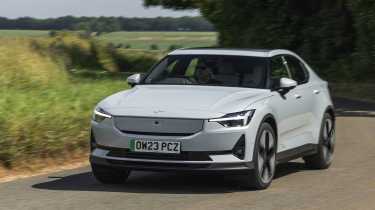New Polestar 2 2023 review – do powertrain updates breath life into Swedish EV?
The new rear-wheel drive Polestar 2 strikes a good balance between range, performance and engagement, but it's not as sharp as an i4
It's rare for a facelift to completely change the powertrain layout and driving behaviour of a car, but in the case of the Polestar 2, a comprehensive 2023 update has seen the base model switch from front to rear-wheel drive, with performance and efficiency improvements spread across the range. The Tesla Model 3 rival has always offered a competitive blend of style, tech and dynamic ability, and with new motors and battery technology, it aims to keep pace with an ever evolving EV market – one that will include a refreshed Model 3 next year.
By and large, the Polestar 2 looks the same as before (albeit with a new front grille plate that houses safety-related sensors) and the cabin is unchanged, but all four models in the range receive revised motors and battery backs. As mentioned, the single motor variant is now rear-wheel drive and starts from £44,950, while the dual-motor Polestar 2 is priced at just under £53,000 and offers a more rear-biased torque delivery than before.
Topping the range is the dual-motor Performance Pack model, which costs £57,950 and brings manually-adjustable Öhlins dampers and a chunky Brembo brake package to the party, among other equipment upgrades. The limited-run BST editions are the most driver-focused of the bunch, but the mass-market Polestar 2 will be our focus here.
Polestar 2 in detail
- Engine, gearbox and technical highlights – Updated electric powertrains bring a stronger blend of performance and range than before
- Performance and 0-60 time – Acceleration is very punchy, but lacks the headline figures of top-tier Teslas
- Ride and handling – A new rear-wheel drive option brings more rewarding, adjustable handling, but the brittle ride can be wearing
- MPG and running costs – A claimed range of over 400 miles is up there with the best electric cars of this size
- Interior and tech – Consider this Volvo interior 2.0 – clever design, decent build quality and an intuitive Google-based infotainment system
- Design – So clearly Scandinavian and just about distinct enough from Volvo to warrant a different badge, it looks substantial, high-tech and, crucially, interesting on the road
Prices, specs and rivals
The Polestar 2 range kicks off with the single-motor variant, which is available with two battery options – Standard and Long Range. These cost £44,950 and £48,950 respectively, while the dual-motor is only available with the bigger battery and commands £52,950. The dual-motor Performance Pack tops the tree with a starting price of £57,950.
Tesla's Model 3 is the most obvious competitor, and a refresh for 2024 aims to build upon what is already an extremely popular, well-rounded EV. Pricing hasn't been announced for the facelifted model yet, but expect it to sit in the £45k region in rear-wheel drive form, rising to around £60,000 for the full-fat Model 3 Performance.
The BMW i4 is another competent EV which, despite its ICE-derived underpinnings, is one of the most polished and cohesive cars to drive in the class. Its packaging and rear seats are a touch compromised compared with pseudo-crossovers like the Polestar 2, but the i4 counters with exceptional interior quality and crisp dynamics to give the Polestar a real headache. It costs £49,995 in eDrive35 form, rising to £71,085 for the 537bhp i4 M50.





